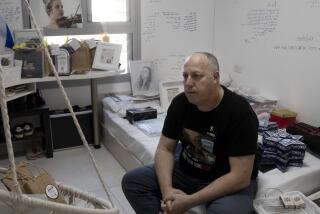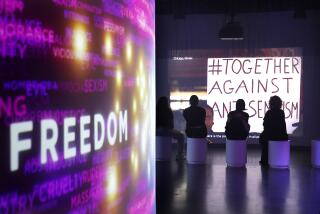‘Matzo Ball Into . . . Won-Ton Soup’ : Jews Who Fled to China Plan Reunion
- Share via
All Jews open the seder meal of the Passover holiday with the traditional question, “Why is this night different from all other nights?”
But for one group of Jews who took refuge in China during World War II, the opening night of Passover in April will be even more unusual this year.
They will be in Shanghai, their city of refuge during the Holocaust, taking part in a reunion that organizers hope will lead to improved relations between China and world Jewry.
“This may be something more than the Pesach that we were thinking about,” said Rabbi Abner Weiss of the Beth Jacob synagogue in Beverly Hills.
Weiss, who is organizing the kosher food for the reunion, said that on a preliminary trip to China late last year, he was besieged by requests from Chinese scholars for additional information about Israel and Judaism and for help in learning Hebrew.
Meetings With Officials
He said Chinese professors and researchers of Jewish affairs told him that the visitors might meet with government officials during their stay in Beijing, where they will visit after spending the holiday week in Shanghai.
Although the Soviet Union recently expanded its diplomatic representation in Tel Aviv and Israel sent a group of diplomats to Moscow, China has no diplomatic relations with the Jewish state.
“I have a hunch they’re feeling a little behind Russia,” Weiss said. “It’s a welcome development.”
Among those scheduled to speak at the reunion is Yosef Tekoah, former Israeli ambassador to the United Nations and president of Israel’s Ben-Gurion University of the Negev, and a former Shanghai refugee.
Other veterans of wartime Shanghai are expected to attend from Australia, France and other countries, as well as from the United States, but the reunion is being organized in Santa Monica, where entrepreneur Peter de Krassel, 42, has his American base of operations.
De Krassel, who exports Western radio and television programs to China and imports sunglasses and other products, said he was not among the estimated 40,000 Jews from Germany, the Soviet Union and elsewhere who spent the war years in Shanghai.
But he said he has friends who were there, and the idea of staging a reunion in Shanghai came up during talks with Chinese officials.
“You inevitably talk about your heritage, your background . . . and the conversations would always come around to Jewish history and Jewish affiliations with China,” he said.
“One thing led to another, and the question came up about wouldn’t it be a good idea to have a reunion. With the Chinese, everything develops mutually, out of mutual friendship. It was just a matter of clearing it through proper channels.”
Although he said he is organizing the April visit with no eye to profit, de Krassel said he might benefit eventually if any of the visitors decide that they need his help to go into business in China. His image as an influential figure may also be increased in Chinese eyes, he said.
He said Passover was chosen because it commemorates the biblical flight of the Israelites from slavery in Egypt, an event with some parallels to the escape of the Shanghai Jews from the Holocaust.
“The reaction has been just phenomenal,” de Krassel said. After a brief mention in a Jewish newspaper published in New York, friends called friends and passed the word until it became “a snowballing matzo ball that’s going to turn into Chinese won-ton soup,” he said.
The trip is scheduled April 18 to 30, with participation limited to about 200 people. The cost will range from $3,950 for tourists who do not want all kosher meals to $4,500 for those who intend to comply with Jewish dietary rules.
Catered Food
Although Chinese chefs will be on hand to lend their expertise, catering for the group will be done by a New Jersey firm with food flown in from the United States, Weiss said.
The German and Austrian Jews who fled to Shanghai have had three reunions, two in the United States and one in Israel, but they have never returned to China as a group.
De Krassel said the April meeting will also bring in people who came from Russia after the Bolshevik Revolution, as well as descendants of an older community of Jews who moved to Shanghai from Iran and Iraq for business reasons.
“It’s a wonderful opportunity for people to re-connect, not just with each other but with a place that had great historical significance for them, and being able to return to pick up a piece of what was,” said Rita Kogan of Beverly Hills, who was born in Shanghai to Russian-Jewish emigres.
De Krassel said he hopes to film the visit, which will include the installation of commemorative plaques on the buildings that housed schools, synagogues and other facilities, for use in a documentary to be aired on public television.
Although Shanghai was controlled by Japanese troops during the war, Berlin-born Gerhard Heimann, a Los Angeles lawyer, said the Jews who lived there suffered more from hunger and disease than from persecution.
“The Japanese were the Germans’ allies, but to the glory of those Japanese who were there, first of all, they let us in without any piece of paper, which is more than you could say for the United States or any other democracy,” Heimann said.
Moved to Special District
It was only after the Germans pressured the Japanese to crack down on the Jews that all stateless people, the Jews among them, were moved to a restricted district of Shanghai in 1943, Heimann said.
Trained as a boy in Shanghai to be a barber, Heimann worked in that trade before he came to the United States and went to law school.
Jews in Shanghai established all of the institutions to which they were accustomed in their home countries, including bakeries that produced matzo, the unleavened bread that is eaten during the Passover holiday.
“I don’t want you to get the impression that it was heaven on earth because it was really tough,” he said. “We didn’t have anything to eat because nobody had anything to eat. Sanitation was very poor in China, and medicines were hard to come by. Nobody beat us on the head, but it was a general bad situation. There was bad rice and bad beans, but there was a hot meal every day.”
Because the German-speaking branch of the former Shanghai Jews--who call themselves Shanghailanders--held their third reunion last year in Israel, some of them were surprised at the recent announcement of de Krassel’s pricey excursion.
“The general consensus is that many Shanghailanders may not want to go back to China, which was mostly misery,” said Curt Pollack, who lives in the San Fernando Valley and publishes a Shanghailander newsletter.
But the organizers “seem to think that this will have political overtones and, if it can accomplish anything for Israel, I’m for it,” he said.
An Israeli diplomat in Los Angeles said the government of the Jewish state would like to see China take an active role in the Middle East peace process, but that it would be “abnormal” as long as Beijing has no diplomatic relations with Jerusalem.
Contacts such as those scheduled during the visit may be a good sign, he said.
More to Read
Sign up for Essential California
The most important California stories and recommendations in your inbox every morning.
You may occasionally receive promotional content from the Los Angeles Times.












